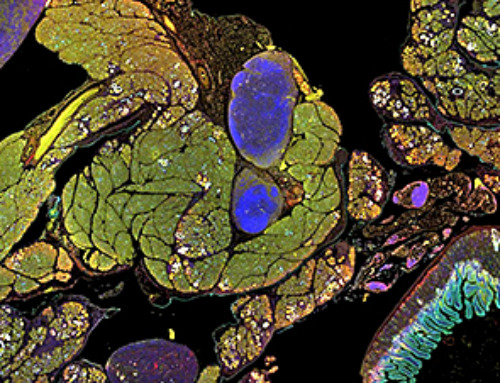A novel type of protein nanoparticle vaccine formulation containing influenza proteins and adjuvant to boost immune responses has provided complete protection against influenza viral challenges, according to a new study published by researchers in the Institute for Biomedical Sciences at Georgia State University.
The researchers developed a novel type of core/shell protein nanoparticle consisting of influenza nucleoprotein as the core and NA1-M2e or NA2-M2e surface proteins as the coating antigens. In the new nanoparticle fabrication, the surface protein coating can be precisely controlled and any excessive coating proteins can be recovered for reuse.
Thus, nanoparticle quality and yield are improved significantly. Mice were intramuscularly or intranasally vaccinated with the resulting protein nanoparticles with and without immune-stimulating complexes as adjuvants to determine the immune response and protective efficiency against influenza viral infections.
“We found that the novel protein nanoparticles combined with the adjuvants could induce significantly improved mucosal immune responses and the accumulation of lung resident memory cells in the local respiratory tracts, providing complete protection against influenza viral infections,” said Dr. Wandi Zhu, first author of the study and a research assistant professor in the Institute for Biomedical Sciences at Georgia State.
Influenza A virus is one of the most threatening respiratory pathogens and can cause severe morbidity, mortality and heavy economic burdens, especially in flu epidemics or pandemics. While vaccination is effective in preventing or reducing viral infections during annual flu seasons, the selection of vaccine strains depends on circulating viral surveillance and prediction.
Mismatched strains could significantly impair vaccine efficiency. Also, the production of the current quadrivalent influenza vaccine is time-consuming. New vaccine technologies are needed to easily manufacture a universal influenza vaccine. The researchers have focused their work on developing different types of protein nanoparticle vaccines against both influenza A and influenza B viral infections.
“The epidemics caused by the influenza virus seriously threaten public health and the economy,” said Dr. Baozhong Wang, senior author of the study and Distinguished University Professor in the Institute for Biomedical Sciences at Georgia State. “Adding appropriate adjuvants to improve immunogenicity and finding effective mucosal vaccines to combat respiratory infection at the portal of virus entry are important strategies to boost protection.”
Adjuvanted protein nanoparticles could improve strong systemic and mucosal immune responses conferring protection in different immunization routes. This work highlights the importance of applying adjuvants in mucosal vaccine formulations. The adjuvanted protein nanoparticles can be used as mucosal vaccines alone or in combination with other vaccines to improve mucosal immunity and protection in the future, Zhu explained.
“The new surface protein coating is a more controlled and efficient fabrication method than our previous process, significantly increasing the utilization of the initial proteins,” Zhu said. “The technique could be used to develop universal influenza vaccines consisting of influenza antigens from influenza A and influenza B viruses. The combination of the vaccine with appropriate adjuvants will be promising mucosal vaccine candidates.”
News
Studies detail high rates of long COVID among healthcare, dental workers
Researchers have estimated approximately 8% of Americas have ever experienced long COVID, or lasting symptoms, following an acute COVID-19 infection. Now two recent international studies suggest that the percentage is much higher among healthcare workers [...]
Melting Arctic Ice May Unleash Ancient Deadly Diseases, Scientists Warn
Melting Arctic ice increases human and animal interactions, raising the risk of infectious disease spread. Researchers urge early intervention and surveillance. Climate change is opening new pathways for the spread of infectious diseases such [...]
Scientists May Have Found a Secret Weapon To Stop Pancreatic Cancer Before It Starts
Researchers at Cold Spring Harbor Laboratory have found that blocking the FGFR2 and EGFR genes can stop early-stage pancreatic cancer from progressing, offering a promising path toward prevention. Pancreatic cancer is expected to become [...]
Breakthrough Drug Restores Vision: Researchers Successfully Reverse Retinal Damage
Blocking the PROX1 protein allowed KAIST researchers to regenerate damaged retinas and restore vision in mice. Vision is one of the most important human senses, yet more than 300 million people around the world are at [...]
Differentiating cancerous and healthy cells through motion analysis
Researchers from Tokyo Metropolitan University have found that the motion of unlabeled cells can be used to tell whether they are cancerous or healthy. They observed malignant fibrosarcoma cells and [...]
This Tiny Cellular Gate Could Be the Key to Curing Cancer – And Regrowing Hair
After more than five decades of mystery, scientists have finally unveiled the detailed structure and function of a long-theorized molecular machine in our mitochondria — the mitochondrial pyruvate carrier. This microscopic gatekeeper controls how [...]
Unlocking Vision’s Secrets: Researchers Reveal 3D Structure of Key Eye Protein
Researchers have uncovered the 3D structure of RBP3, a key protein in vision, revealing how it transports retinoids and fatty acids and how its dysfunction may lead to retinal diseases. Proteins play a critical [...]
5 Key Facts About Nanoplastics and How They Affect the Human Body
Nanoplastics are typically defined as plastic particles smaller than 1000 nanometers. These particles are increasingly being detected in human tissues: they can bypass biological barriers, accumulate in organs, and may influence health in ways [...]
Measles Is Back: Doctors Warn of Dangerous Surge Across the U.S.
Parents are encouraged to contact their pediatrician if their child has been exposed to measles or is showing symptoms. Pediatric infectious disease experts are emphasizing the critical importance of measles vaccination, as the highly [...]
AI at the Speed of Light: How Silicon Photonics Are Reinventing Hardware
A cutting-edge AI acceleration platform powered by light rather than electricity could revolutionize how AI is trained and deployed. Using photonic integrated circuits made from advanced III-V semiconductors, researchers have developed a system that vastly [...]
A Grain of Brain, 523 Million Synapses, Most Complicated Neuroscience Experiment Ever Attempted
A team of over 150 scientists has achieved what once seemed impossible: a complete wiring and activity map of a tiny section of a mammalian brain. This feat, part of the MICrONS Project, rivals [...]
The Secret “Radar” Bacteria Use To Outsmart Their Enemies
A chemical radar allows bacteria to sense and eliminate predators. Investigating how microorganisms communicate deepens our understanding of the complex ecological interactions that shape our environment is an area of key focus for the [...]
Psychologists explore ethical issues associated with human-AI relationships
It's becoming increasingly commonplace for people to develop intimate, long-term relationships with artificial intelligence (AI) technologies. At their extreme, people have "married" their AI companions in non-legally binding ceremonies, and at least two people [...]
When You Lose Weight, Where Does It Actually Go?
Most health professionals lack a clear understanding of how body fat is lost, often subscribing to misconceptions like fat converting to energy or muscle. The truth is, fat is actually broken down into carbon [...]
How Everyday Plastics Quietly Turn Into DNA-Damaging Nanoparticles
The same unique structure that makes plastic so versatile also makes it susceptible to breaking down into harmful micro- and nanoscale particles. The world is saturated with trillions of microscopic and nanoscopic plastic particles, some smaller [...]
AI Outperforms Physicians in Real-World Urgent Care Decisions, Study Finds
The study, conducted at the virtual urgent care clinic Cedars-Sinai Connect in LA, compared recommendations given in about 500 visits of adult patients with relatively common symptoms – respiratory, urinary, eye, vaginal and dental. [...]





















